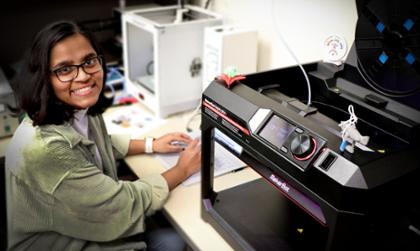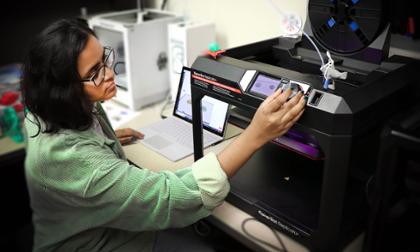The Governor’s Scholars Program recognizes outstanding graduating seniors who finish in the top one percent of their high school graduating class. Anjali graduated from Pittsburg High School with a 4.5 and several college credits.
Now, she is following in the footsteps of her father — a father who happens to be among the top 2 percent of scientists in the world and who works at Pitt State.
Associate Professor Ram Gupta teaches in the Department of Chemistry and leads research at NIMA that focuses on green energy production and storage using nanomaterials.
His daughter plans to earn her degree in Chemistry with an emphasis in Pre-Medicine to be able to pursue her passion for medical research.
“Ultimately, I plan to become an infectious disease doctor and research treatments in that field,” she said.
Her work at NIMA has given her experience in a laboratory setting and the ability to understand scientific processes.
“What I really like about working here [NIMA] is that I contribute to something for the greater good,” Anjali said. “Even if I don’t discover a breakthrough, somebody could read about what we are doing and use it to help them come up with a solution.”

Her experience in the lab wasn’t a special favor from dad; any qualified high school and university student with an interest in chemistry and research may apply to work at NIMA alongside scientists from around the world.
There, they’re working to find ways to convert agricultural and household waste — think chicken fat, used coffee grounds, and the parts of the soybean plants that are left in the field after harvest — into sustainable, eco-friendly products.
Or, more scientifically speaking, they’re working with polyurethanes, bio-based materials, polymer foams, and electroactive materials.
NIMA collaborates with industrial partners, organizations, state and federal agencies, and producer associations to develop and commercialize their research findings as intellectual property.
The labs give students like Anjali access to cutting edge equipment like a scanning electron microscope, X-ray diffraction, infrared spectrometer, thermal analyzer, and equipment used for synthesis and electrochemical testing.

A few years ago, two local high school students worked with Gupta to find a solution to convert biowaste like pomegranate shells, used coffee grounds, and soybean stems, leaves, and shells into an energy storage device.
Other students have helped to develop an eco-friendly, flame-retardant foam that can be used in commercial applications such as construction and automobiles.
The skills that students like Anjali are learning also have a direct application to the workforce in Kansas, where nearly half a million people are employed in plastics and polymer industries.
Beyond Kansas, the sky’s the limit, her dad said, when it comes to these students finding lucrative jobs in the field — what they’re doing is the future.
Their work has attracted national attention, bringing to campus in recent months a U.S. congressman, the head of the National Science Foundation, and a top state official — all whom agreed that research here could lead to significant manufacturing and employment opportunities.
“There is so much potential here,” said NSF Director Sethuraman Panchanathan on a visit in January. "The kind of work that is happening here at Pitt State should happen across the U.S. The ideas that are generated here, they can be the basis for us to become stronger, more competitive, and prosperous as a nation.”
Learn more: